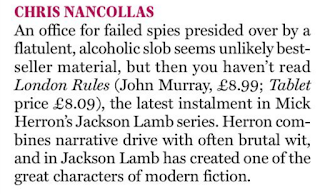Wednesday, July 25, 2018
Mick Herron!
Having been born long ago enough to have lived through some of the Cold War, I was too young to have been interested in reading spy fiction of the times. And soon enough, the Berlin Wall came down, the Soviet Union dissolved, and most spy fiction seemed to become irrelevant. Or implausible. Or ridiculous. (Invariably, one man racing against a ticking clock to prevent the destruction of the world. And only this one man can do it.)
Maybe 20 tears after the end of the Cold War, enough time had passed for that era to become of interest again for me. I read my first John le Carre novel, Tinker, Tailor, Soldier, Spy and was blown away. The vocabulary of espionage in that book was a revelation to me - some of the words I knew of, others were new, some real, and some invention. And some having been coined by le Carre had passed into general usage:
tradecraft
safety signals
juju men
housekeeping
mailfist job
lamplighters
(Actually, I am no longer certain which words are real or made up or even in use.)
But the question of what should come next had no good answer as far as I was concerned. I'm generalizing but all of the spy fiction I saw looked formulaic or outdated. Or farfetched. Until I stumbled upon Mick Herron and his Slough House series.
In a nutshell, instead of having elite special agents populate a series, Herron has created a series stocked with agents from the trash bin. If you screw up and MI5 thinks it will cost too much to fire you, you are exiled to a building called Slough House, where you are consigned to do mindless paperwork assignments until you quit. (Denizens of Slough House are called slow horses.) But it turns out that often these agents are not washed up - they've merely been disposed of by a corrupt or dysfunctional hierarchy or are scapegoats - and are still quite skilled.
In the first book in the series, Slow Horses, they work to track down a domestic terror cell that is threatening to execute a hostage on the internet. In Dead Lions, they investigate the death of an old spy whose death may have a connection to a Russian oligarch. In Real Tigers, a slow horse is kidnapped and Slough House responds. (There's also a novella called The List, concerning how old spies are looked after.) (And there's a great stand alone called Nobody Walks, set in the same fictional universe but not a part of the series.)
I devoured Slow Horses, Dead Lions, Real Tigers, The List, and Nobody Walks way back in 2016 - which feels like YEARS ago. Brexit and Trump's Russia scandal displaced my desire to read spy fiction for a while. But the prolific Herron has since written two more Slough House novels, Spook Street (which I am currently reading) and London Rules. He also managed to write another standalone thriller This is What Happened (which is waiting for me at the library). And somehow he's had the time and energy to write another novella in the Slough House world set for this fall called The Drop.
All of these books are absolute page turners but yet are filled with fantastic detail and insight that does not bog down the reader. The plots are all very relevant to the headlines (bad Russians, fundamentalists, sleeper cells, bad politicians, terrorisms, the internet) and make for convincing stories.
In terms of language, Herron invents (or seems to? who knows?) some new spy words: stoats, weasels, Dogs, joes, and the Enhanced Retirement Package. And what I may love the most, that really good dialog you get in certain spy novels where they spell out how the either know things or have worked things out. It's so cool and convincing and this trick has the reader convinced something special is happening.
In sum, go and read Mick Herron. Just do it. Start at the beginning with Slough Horses. Buy a few of his books at a time as you will want to start the next as soon as you've finished your first one.
(Bonus: I was looking at the Summer reading issue of The Tablet and Herron gets recommended three times.
Subscribe to:
Post Comments (Atom)




No comments:
Post a Comment